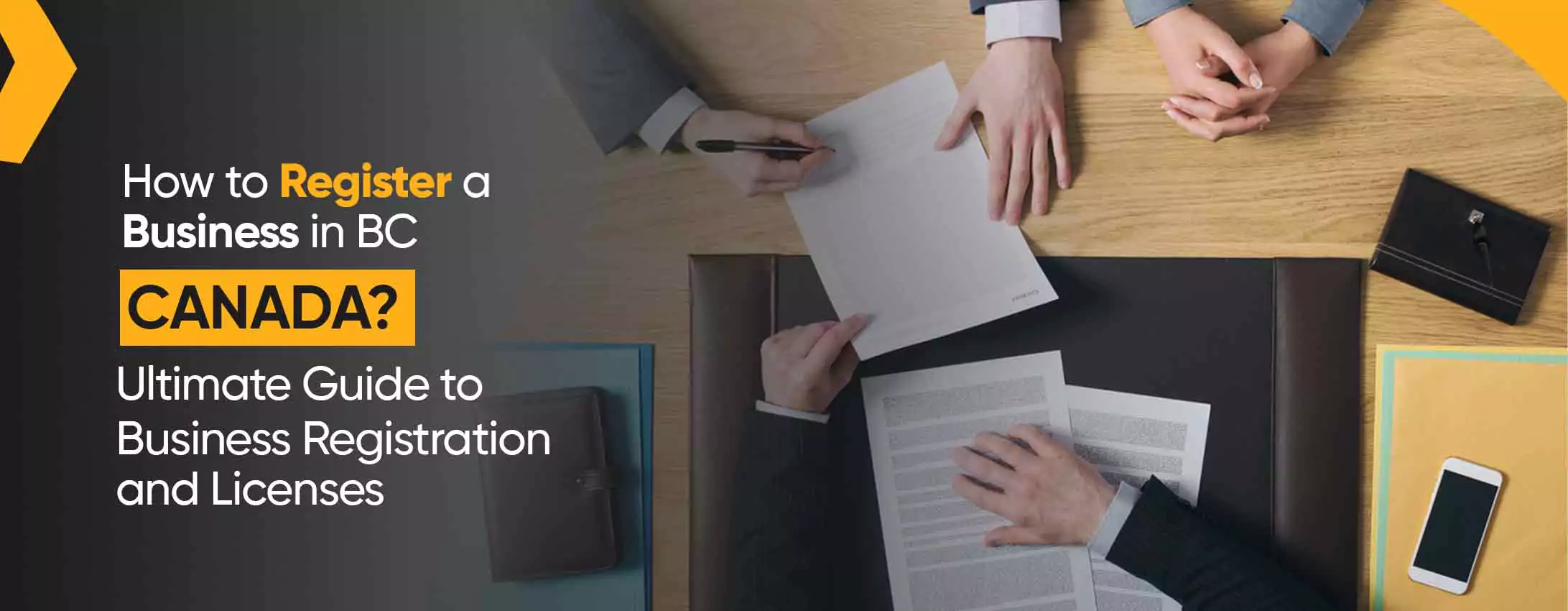BC is a province full of opportunities for entrepreneurs. Nestled on Canada’s west coast, BC boasts a vibrant economy, diverse culture, and stunning landscapes. It’s no wonder many are eager to learn how to register a business in BC and make their entrepreneurial dreams a reality.
If you are also one of them then hop onto the bandwagon as we discuss business setup in British Columbia in detail and answer all your questions:
Why Registering Your Business in BC Matters
Registering your business does more than make it legal. It opens doors to securing financing, protects your brand, and helps build trust with customers. Plus, it ensures you comply with local regulations and allows you to apply for a British Columbia business license or necessary permits.
Let’s walk through the steps for how to register a business in BC and build a solid foundation for success.
Step-by-Step Guide on How to Register a Business in BC
Step 1: Decide on a Business Idea
The foundation of any business is its idea. Entrepreneurs typically fall into two categories:
- Those who already know what business they want to start.
- Those who are exploring possibilities.
Here’s how to choose the right idea for you:
- Play to Your Strengths: Consider your skills, experience, or educational background. For instance, if you’re a skilled baker, starting a bakery is a logical choice.
- Align with Your Passion: Running a business takes commitment, so choose something you’re excited about.
- Research Viability: Is your idea profitable? Look into demand and competition.
Example: If you love fitness, opening a yoga studio could combine your passion with a growing market demand.
Step 2: Test Your Business Idea
Having an idea is great, but does the market need it? Testing your idea involves research and feedback:
- Identify Your Target Audience:
- Understand their demographics: age, gender, income, and values.
- Example: If you’re selling eco-friendly products, your audience might be environmentally conscious millennials.
- Study Competitors:
- See what similar businesses are doing. Identify their strengths and weaknesses.
- Example: If competitors have slow delivery times, you can focus on faster service.
- Analyze Market Demand:
- Use tools like Google Trends to see how often people search for terms like “how to register a business in BC.”
- Conduct Surveys:
- Ask potential customers for feedback. Offer free samples or discounts in exchange for honest reviews.
Step 3: Choose a Business Name
Register Your Business Name
The first step is to secure and register your business name with BC Registry Services. The process varies depending on the business structure you’ve chosen:
For Sole Proprietorships and Partnerships
- Step 1: Ensure your desired business name is available by conducting a name search.
- Step 2: Complete the registration form with BC Registry Services.
- Step 3: Pay the required fee to finalize your registration.
This process is straightforward and quick, allowing you to focus on launching your business.
For Corporations
Registering a business name for a corporation involves additional steps:
- Conduct a NUANS Name Search: A NUANS report ensures your business name isn’t already in use.
- Prepare Articles of Incorporation: These documents outline your corporation’s structure and operations.
- Submit a Cover Letter and Incorporation Application: Include your Articles of Incorporation and pay the required fee.
Upon registration, you’ll receive a Business Identification Number (BIN), which is your official identifier for government interactions.
Step 4: Decide on a Business Structure
Choosing the right structure depends on your goals and resources. We will discuss them all later on.
Moving on to the main step of how to register a business in BC:
Step 5: Register or Incorporate Your Business
Once your business name is approved, it’s time to register or incorporate.
- Registering a Business in BC:
- Complete a Name Request.
- Submit your registration online through OneStop, in person, or by mail.
- Processing usually takes 5 business days.
- Incorporating a Business in BC:
- Submit Articles of Incorporation.
- Hire a professional to ensure all documents are in order.
Well now you have done the main part and know how to register a business in BC. Let’s Move on to actually starting your business in BC.
Step 6: Write a Business Plan
A business plan is your roadmap to success. It’s especially important if you need funding. It is a main key to start a profitable business in Canada. It Includes:
- Your goals and mission.
- Target market analysis.
- Financial projections.
- Marketing strategies.
Step 7: Secure Business Financing
Starting a business requires funds. Explore these options:
- Government Grants: Check BC and federal programs.
- Crowdfunding: Platforms like Kickstarter can help.
- Angel Investors: Perfect for startups with high growth potential.
Step 8: Develop an Online Presence
In today’s digital world, customers expect to find you online.
- Create a website showcasing your services.
- Use social media platforms like Instagram or LinkedIn.
Example: A bakery might share mouth-watering photos of cakes on Instagram to attract customers.
Step 9: Register for GST and PST
The Goods and Services Tax (GST) is a federal tax of 5% applied to most goods and services across Canada. If your business earns gross annual revenue exceeding $30,000, registering for GST is mandatory.
Even if you don’t meet the $30,000 threshold, registering for GST/HST can be advantageous. You can claim Input Tax Credits (ITCs), which allow you to recover GST paid on business expenses like supplies, equipment, and services.
BC briefly adopted HST in 2010, combining GST and PST into a single tax. However, this system was eliminated in 2013, and BC reverted to a dual GST (federal) and PST (provincial) system.
The Provincial Sales Tax (PST) applies to specific goods and services in BC. Unlike GST, PST is a provincial tax and has unique rules and rates.
Contact Bestax today to simplify your GST and PST registration and keep your business running smoothly!
Step 10: Apply for Licenses and Permits
Every business operating in BC must obtain a business license from the municipality where it’s based. Each city has its own requirements, so check their official website for:
- Application forms
- Fees
- Renewal details
Food and Alcohol Services
If your business serves food or alcohol, you’ll need:
- A Food License
- A Health Operating Permit from the provincial government
Depending on your industry, you may need additional licenses or permits to operate. Use BizPaL, a free online tool, to get a customized list of required permits.
BizPaL Offers Information for:
- Federal requirements
- Provincial permits
- Over 130 communities in BC
A Handy Checklist: Steps to Opening a Compnay in BC
| Step | What to Do | Example |
| Decide on a business idea | Pick something you’re passionate about and skilled in. | A tech startup, bakery, or consultant. |
| Test your idea | Research your market, competitors, and potential customers. | Conduct surveys or online polls. |
| Choose a name | Create a unique business name that resonates with your brand. | “West Coast Bites” for a bakery. |
| Pick a structure | Decide between sole proprietorship or corporation. | Corporation for liability protection. |
| Register your business | Submit a name request and register online via OneStop. | Takes 5 days on average. |
| Write a business plan | Outline goals, market strategies, and financial forecasts. | A bakery plan with a 2-year goal. |
| Secure financing | Apply for grants, angel investments, or loans. | Small Business BC grants or crowdfunding. |
| Build an online presence | Create a website or social media profiles to attract customers. | Use platforms like Instagram. |
| Register for taxes | Sign up for GST and PST if your revenue exceeds $30,000. | Apply through the CRA. |
| Get licenses and permits | Apply for industry-specific and municipal licenses. | Use BizPaL for a tailored list. |
Choosing the Right Business Structure for Your Business in BC
Selecting the right type of business structure is a crucial decision when starting a business in BC. Your choice determines how you’ll report income, file taxes, and manage liabilities. Here’s a detailed look at the three main business structures in BC: sole proprietorship, partnership, and corporation.
1. Sole Proprietorship: Simplicity at Its Core
A sole proprietorship is the simplest and most common type of business structure. It’s perfect for small-scale businesses or individuals looking to keep things straightforward.
Key Features:
- Owned and operated by one individual.
- No legal distinction between the owner and the business.
- The owner makes all decisions, earns all profits, and assumes all risks.
Advantages:
- Simple to set up and manage.
- Full control over the business.
- Taxed as part of your personal income, making reporting straightforward.
Disadvantages:
- Unlimited liability: Your personal assets (e.g., home, savings) are at risk if the business incurs debts.
- Harder to secure funding compared to a corporation.
Taxes for Sole Proprietors:
You’ll file taxes using a T1 Income Tax and Benefit Return. You must file if:
- You owe taxes or had taxable gains.
- You want to claim credits like GST/HST or the Canada Child Benefit.
- You’re entitled to provincial tax credits or want EI special benefits.
Example: A freelance graphic designer operating under their legal name would use a sole proprietorship. If they choose a business name like “Creative Edge,” they’d need to register it and open a separate bank account.
2. Partnership: Shared Responsibilities and Profits
A partnership involves two or more individuals, corporations, or trusts joining forces to operate a business. Partnerships are great for sharing skills, resources, and risks.
Key Features:
- Partners contribute money, skills, or property.
- Profits (or losses) are shared based on the partnership agreement.
- A simple verbal agreement is enough to form a partnership, but a written agreement is highly recommended.
Advantages:
- Easier to start than a corporation.
- Shared responsibilities and financial burden.
- Combines the skills and resources of multiple people.
Disadvantages:
- Shared liability: Actions by one partner can legally bind all partners.
- Potential for disputes if roles and responsibilities aren’t clearly defined.
Example: Two friends opening a coffee shop might pool their resources and create a partnership. One focuses on operations, while the other handles finances. A written agreement ensures clarity on profit-sharing and responsibilities.
3. Corporation: A Separate Legal Entity
A corporation is a more complex business structure but offers significant benefits like limited liability and access to funding.
Key Features:
- The corporation is a separate legal entity from its owners.
- Shareholders own the corporation, and directors manage it.
- Provides liability protection, meaning personal assets are safe from business debts.
Advantages:
- Limited liability for owners.
- Easier to raise funds through loans or by issuing shares.
- Tax advantages, as corporate tax rates are often lower than personal tax rates.
Disadvantages:
- More complex and expensive to set up.
- Requires ongoing compliance, including filing a T2 Corporation Income Tax Return (mandatory for most corporations after 2023).
Example: A tech startup planning to attract investors would benefit from incorporation. The corporation’s separate legal status provides credibility and safeguards personal assets.
How to Decide?
When choosing a structure, consider these questions:
- How much control do you want?
- Are you comfortable with personal liability?
- Do you plan to scale your business and attract investors?
Bestax Can Help You Choose!
If you’re unsure which structure suits your goals, Bestax can guide you. From analyzing your needs to setting up your business, we’re here to make the process smooth and stress-free.
Contact Bestax today to get started on registering your business in BC!
Resources and Support for Small Businesses in BC, Canada
Starting a business in BC is exciting, but it also comes with challenges. Fortunately, there are numerous resources and support programs available to help entrepreneurs succeed. Whether you’re looking for funding, mentorship, or specialized resources, BC offers a wealth of opportunities. Let’s explore some of the most valuable programs and services for business owners.
1. Canada Small Business Financing Program (CSBFP)
The Canada Small Business Financing Program (CSBFP) helps small businesses and start-ups access loans by sharing the risk with lenders. Over the past decade, this program has provided over 53,000 loans, totaling $10 billion.
Eligibility
- Open to small businesses or start-ups operating in Canada with gross annual revenues of $10 million or less.
- Farming businesses are not eligible but can access the Canadian Agricultural Loans Act Program.
- Maximum Loan Amount: $1.15 million per borrower.
How to Apply
- Visit a financial institution like a bank, credit union, or caisse populaire.
- Discuss your business needs with a financial officer.
- Submit your business proposal for loan review.
- Once approved, the financial institution will disburse funds and register the loan with Innovation, Science and Economic Development Canada (ISED).
2. WorkBC Employer Resources
WorkBC provides a range of resources for employers to help with recruitment, training, and funding.
Highlights:
- BC Employer Training Grant: Supports employers in providing skills training for workers.
- Job Board: Connects employers with job seekers across BC.
- Financial Incentives for Diversity Hiring: Employers may qualify for incentives when hiring:
- Indigenous people
- Youth workers or apprentices
- People with disabilities
- Immigrants or temporary foreign workers
Example: A tech company could use WorkBC’s job board to find qualified candidates and receive training grants to upskill their team.
3. Indigenous Small Business Resources
Indigenous entrepreneurs in BC have access to tailored support to help their businesses thrive.
Available Resources:
- Skills Training Programs
- Indigenous Business Directory: Promotes Indigenous-owned businesses to the public and other organizations.
- Banking and Financing Services: Includes loans and grants specifically for Indigenous entrepreneurs..
4. Pacific Economic Development Canada (PacifiCan)
PacifiCan supports economic growth in BC by offering training, funding, and mentorship programs.
Key Offerings:
- Business training and development programs.
- Access to capital for growth.
- Mentorship programs tailored to various industries.
- Funding programs to support diverse business needs.
5. Entrepreneurs with Disabilities Program
This program is designed to support entrepreneurs with disabilities in Western Canada.
Services Provided:
- Business Mentoring: One-on-one guidance to navigate challenges.
- Counseling: Support for personal and business development.
- Training and Development: Workshops and programs to enhance skills.
- Loans: Financial support to start or grow a business.
Start Your Business in BC with Confidence
Starting a business in British Columbia can be simple if you follow the right steps. From learning how to register a business in BC to choosing the best structure, registering for taxes, and securing funding, BC offers great opportunities and resources for entrepreneurs.
Take advantage of programs like the Canada Small Business Financing Program, WorkBC, and more to grow your business. Don’t forget to register for GST/HST and PST and get all the necessary licenses to operate legally.
Bestax is here to help you every step of the way. We make it easy to register your business, apply for permits, and access funding. Let us handle the hard part while you focus on your dream.
Contact Bestax today and get expert help to set up your business in BC quickly and easily!
FAQs on How to Register a Business in BC
1. How much does it cost to register a business in BC?
The cost to register a business in BC depends on the type of business.
2. Can I run a business without registering in BC?
You can operate as a sole proprietor using your legal name without registering, but if you use a business name or plan to expand, registration is required. Running an unregistered business may limit your growth and access to permits or financing.
3. Do I need to register my business name in BC?
Yes, you must register your business name with BC Registry Services unless you’re operating as a sole proprietor under your legal name. Name registration ensures your business identity is unique and legally recognized.
4. Do I need a business license in BC?
Yes, most businesses in BC require a business license from the local municipality where they operate. Specific industries, such as food and alcohol services, may require additional permits.
5. How long does it take to register a company in BC?
Registering a company in BC typically takes 5–10 business days. The timeline can vary depending on whether you’re registering online, in person, or by mail.6. Is it worth it to incorporate in BC?
Incorporating offers benefits like limited liability, tax advantages, and easier access to funding. While it involves higher costs and more paperwork, it’s often worth it for businesses planning to grow or seeking investor support.
Disclaimer: The information provided in this blog is for general informational purposes only. For professional assistance and advice, please contact experts.




